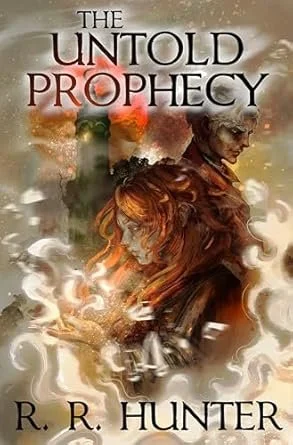Book Review: The Untold Prophecy by R.R. Hunter
The Untold Prophecy stands apart from traditional fantasy by forgoing a world of overt magic and mythical creatures. Instead, it presents a setting reminiscent of mid-eighteenth to nineteenth-century Britain—one grounded in industrial and social upheaval. While some have described it as steampunk, the atmosphere leans more toward historical realism. Society is in the throes of an industrial revolution, with machines transforming political and social landscapes. These machines, however, are not powered by science, but by a mysterious artefact known as Athier, discovered at excavation sites tied to ancient and forgotten civilisations.
Hunter’s world echoes the rigid class divisions of Georgian and Victorian Britain, with powerful gentry and landowners holding sway over the struggling working class, who face the erosion of traditional jobs due to mechanisation. Unrest brews beneath the surface, and though some magic exists, it remains subtle and secondary to the technological themes.
Hunter excels in his world-building. His prose is vivid and polished, painting environments and atmospheres with striking clarity. His command of language is impressive, and his vocabulary is rich. However, at times, the frequent use of similes becomes excessive, slowing the narrative and restricting the reader’s imagination. Similarly, while his creative manipulation of language—such as using nouns in place of verbs—can be clever, it occasionally disrupts flow and clarity, making the book more challenging to read than it needs to be.
The plot centres on Lord Berik, a nobleman drawn into investigating a series of seemingly unrelated incidents. He becomes entangled in an ancient prophecy involving the mysterious Drakon, the Athier, and a young girl he takes into his care. The story is layered with complexity—prophecies, an ancient race, political unrest, and a broad cast of characters. As a result, the narrative takes time to find its footing. The first three chapters each focus on different characters, making it difficult to determine who the protagonist is. It’s not until around chapter ten that the pieces begin to align.
Character development is another area of mixed success. Several main characters are featured, each with their own flaws and motivations, making their interactions engaging and believable. Readers can sense the weight and uncertainty behind their decisions. However, most characters feel already established, with motivations rooted in past events that are only briefly mentioned. As a result, their emotional arcs remain somewhat static. Only Daerion shows significant growth from beginning to end, offering a more satisfying character journey.
In summary, The Untold Prophecy is a highly ambitious and thoughtfully constructed debut. R.R. Hunter is clearly a skilled writer, with a gift for language and immersive storytelling. However, the book's complexity and literary style may divide readers. Those who appreciate intricate, slow-burning world-building will find a great deal to enjoy. Others, seeking faster-paced action or lighter prose, may struggle to stay engaged through the early chapters. That said, Hunter has created a compelling, original world that sets itself apart from mainstream fantasy. With some refinement in pacing and stylistic restraint, future instalments in the series could prove exceptional. I’d be very interested in returning to see how this ambitious narrative unfolds.


